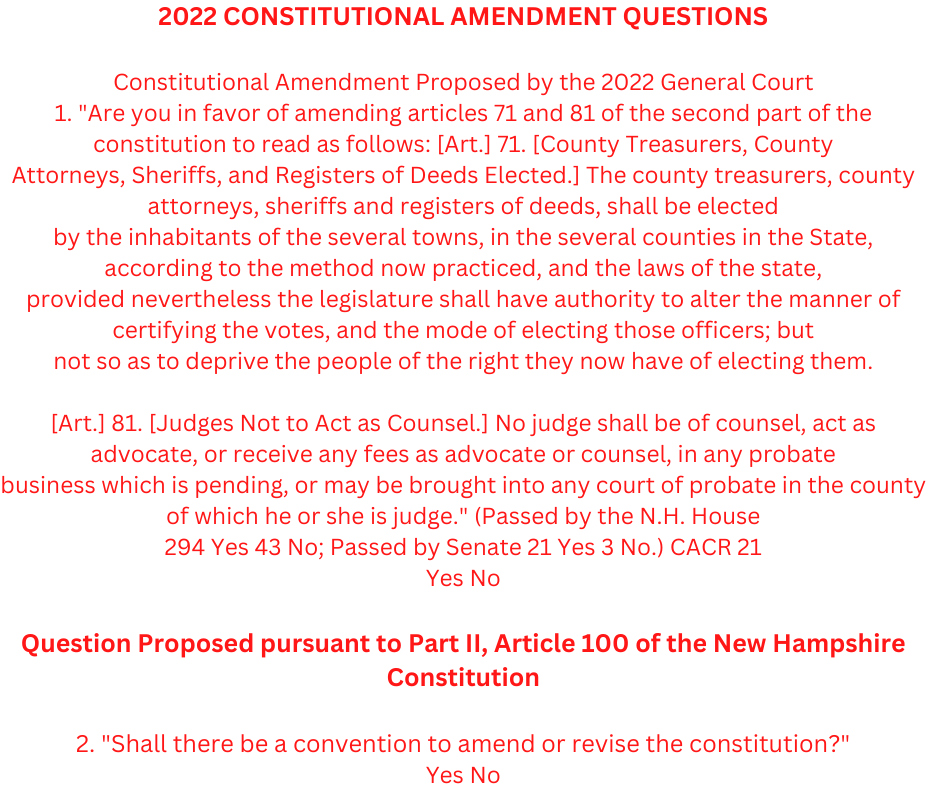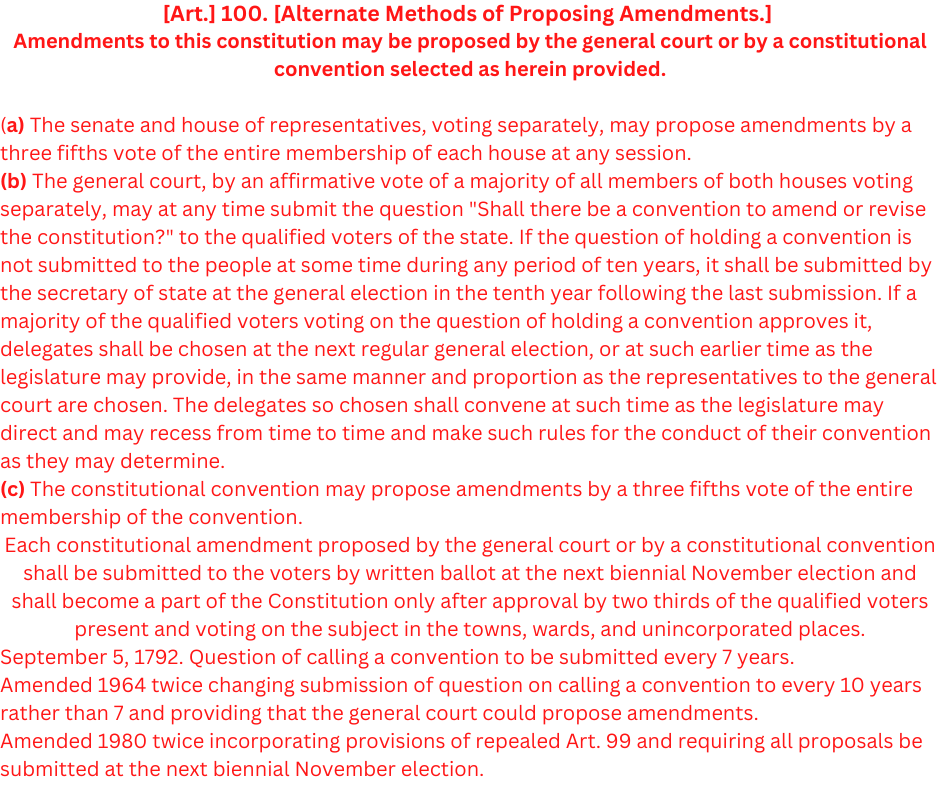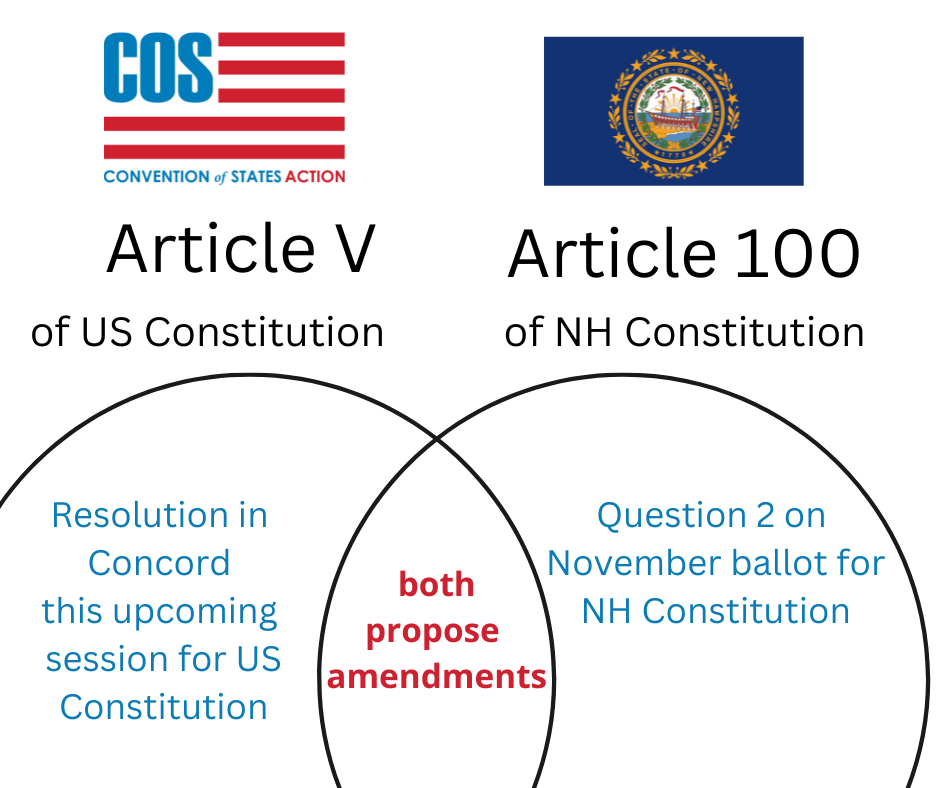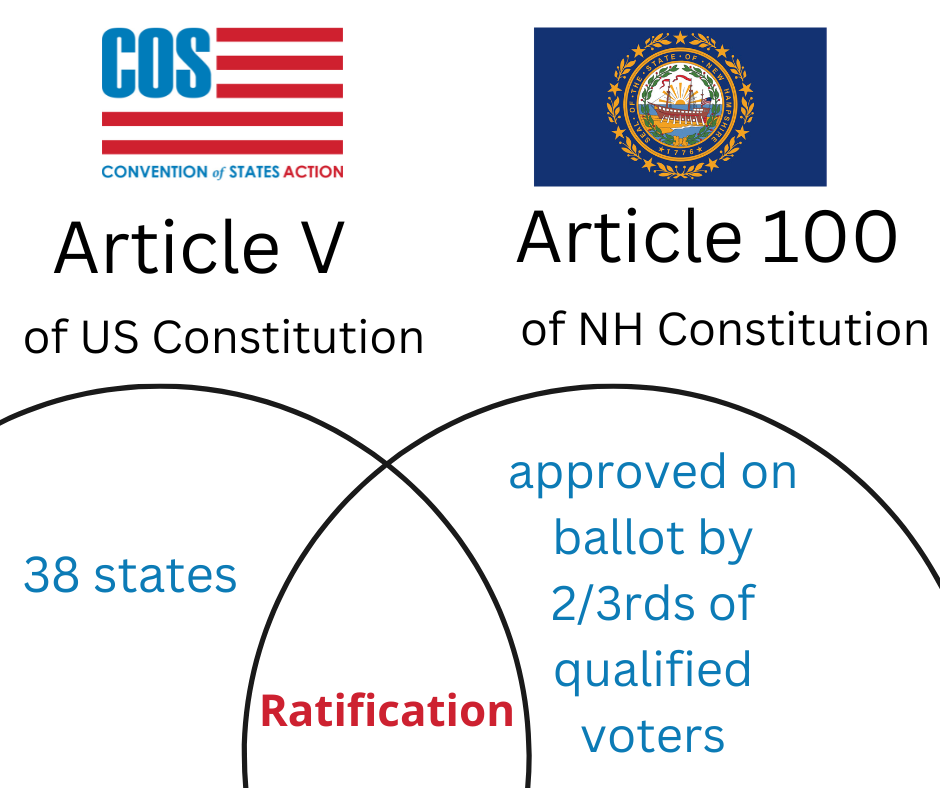I invite you to go to the Secretary of State's webpage to find a sample ballot for your ward. Not only will you find the candidates listed, but also you will find 2 questions. You can also find samples at your town hall.

Notice how the 1st question tries to modify two Articles, Article 71 and Article 81 with one question? Upon first glance, a voter may want to vote one way for the first part and another for the second part, but are only given the opportunity to vote one way for both parts. CACR 21 instructs the Secretary of State to create the ballot in this manner, as the goal was to remove the "Register of Probate" language in the two places. **Note- CACR 21 used Article 100, the first part, to propose a Constitutional change.
The ballot does not show the voter what the original wording is for Article 71 & 81. Here is the original wording for complete understanding:
[Art.] 71. [County Treasurers, Registers of Probate, County Attorneys, Sheriffs, and Registers of Deeds Elected.] The county treasurers, registers of probate, county attorneys, sheriffs and registers of deeds, shall be elected by the inhabitants of the several towns, in the several counties in the state, according to the method now practiced, and the laws of the state, Provided nevertheless the legislature shall have authority to alter the manner of certifying the votes, and the mode of electing those officers; but not so as to deprive the people of the right they now have of electing them.
June 2, 1784
Amended 1792 twice adding proviso that the legislature could alter the manner of certifying the votes and mode of electing the officers; deleting oath and bond of county treasurer and transferring oath and bond of register of deeds to next article.
Amended 1877 adding registers of probate, county solicitors, and sheriffs to those to be elected.
Amended 1958 changing county solicitor to county attorney.[Art.] 81. [Judges and Registers of Probate Not to Act as Counsel.] No Judge, or Register of Probate, shall be of counsel, act as advocate, or receive any fees as advocate or counsel, in any probate business which is pending, or may be brought into any Court of Probate in the county of which he is Judge or Register.
September 5, 1792
Click here to see the voter guide, which will also be provided at the polls. Excerpt from the Voter Guide:
Explanation:
AT THE PRESENT TIME, the constitution references registers of probate while the office’s duties were redistributed to circuit court clerks in 2011.
IF THE AMENDMENT IS ADOPTED, the constitution will no longer include the reference to registers of probate.
Looking at the ballot with the House and Senate votes reported, it shows how our Legislators feel that the Register of Probate is an "obsolete elected position." You can read more from the passed CACR 21.
Click here for the hearing notes. This testimony was helpful:
Judge King stated the register of probate office was established in 1964. The role of registers remained the same until 2011 when the circuit court was created, and the registers of probate joined the court as elected officials. These registers were full-time positions with state benefits. In 2011 when the circuit court was created Judge King testified then that if the registers of probate never showed up it would be fine. His testimony remains the same.
Currently, probate calls are taken by the call center and this process is successful.
Electronic filing resulted in the elimination of staff members and saved $60 million over 10 years.
As shown above in Article 71, "Amended 1877 adding registers of probate, county solicitors, and sheriffs to those to be elected." So apparently in 1877, the register of probate was important enough to be added as an elected position.
I am curious, who decided in 2011 to redistribute the Registers of Probate duties? Who authorized the decision to take away work from elected officials?
Rep Gordan shared, "Registers of probate, district court clerks and family court clerks were doing the same work. The circuit court combined these roles and saved the state money."
Would a "call center" be a helpful resource for we the people or would a register of probate clerk who works at the location with the judges and knows how the system works be more helpful for we the people?
Hopefully, these links that I have provided will empower you to read and decide how you will vote on question one.
*******************************************
Question two: "Shall there be a convention to amend or revise the constitution?

If NH were to want to have a NH Constitution amending convention, "we the people" could strengthen NH's structural issues. Let's compare Article 100 of NH's Constitution with Article V of US Constitution.

With both a Convention of States, the use of Article V of US Constitution, and NH's Article 100, the delegates are the ones who come up with the correct wording for any proposals.
NH elects the delegates at the next general election with NH's Article 100 (see part b under Article 100 above), whereas the Legislature gets to choose who is a delegate for a Convention of States when utilizing Article V of US Constitution.
In NH's Article 100, if 3/5th of the Delegates approve the wording at NH's proposing convention, then those proposals get on the next biennial November ballot. With a Convention of States, Article V of US Constitution, a simple majority vote decides if the proposal goes back to the states to be ratified.

Here are some ideas to get you thinking if you would like to exercise your right to use Article 100 here in NH. The founders of NH's Constitution felt it necessary to insert this feature for "we the people's" benefit. Again, the delegates elected would decide wording and topics.
For example, imagine proposing something like this, a solution to November's ballot confusion:
- All Amendments seeking ratification from NH's qualified voters on the ballot must have one question per Article.
- For changes to an Article, ballot must show original Article, then question: “Do you want to modify Article __ to …,’” and must state new Article as proposed. If modification is too lengthy for ballot, then only propose wording shall be on the ballot and voter guide shall have both the original and proposal listed.
Like a Convention of States, we could propose term limits:
- Governor is only allowed to serve 2 terms for 2 year each.
- Judges shall be elected for 2 year terms.
- All Attorney Generals, City/town attorneys, and other attorneys shall be elected for 2 year terms.
- Every elected official’s term is for 2 years.
Adjudication, we could propose:
- All judges, Attorney General, City/Town Attorney’s must adjudicate and give guidance according to the original intent of both the NH and US Constitutions.
Finances, we could propose:
- All Federal funds coming into NH are to be approved by 2/3rd of BOTH NH House and NH Senate Legislatures. [Currently they are received in through the Executive Branch.]
Structure, we could propose:
- The word ”town” in the NH Constitution shall include the word “cities” as well as current definition. All Cities must follow NH Constitution. All City Charters must reflect the NH Constitution or be removed.
- All governing bodies that are funded by taxpayers shall be elected.
- All elected officials must take both a NH and US Constitutions class the 1st week in office. Approved class material must teach original intent of both NH and US Constitutions. Approval of curriculum to only contain the original intent content must be approved by 2/3rd of both House and Senate. [Wouldn't this be fabulous for Congress as well with a Convention of States? How can they uphold their oaths without knowing what they are swearing to uphold?]
- Any violations to these Oaths of both Constitutions once elected will result in removal of office once investigation is complete, within 30 days of accusation. Investigation will be completed in a public hearing of peers: House Representative by the House Chamber, Senator by the Senate Chamber, city/town by the city/town governing board, Governor/Executive Counselors by the Executive Branch, Judges by the Judicial Branch, DHHS and current unelected officials by the House/Senate Joint committee. The hearing results decide if the oath violator is allowed to run for office in the future and if criminal charges will also be filed. The loosing candidate of that election cycle will complete the term.
Bills in general, we could propose: (previously shared from from GraniteGrok here)
- No bill is to exceed 10 pages.
- All bills are to be accompanied by the Constitutional Article authorizing said bill or not allowed to be proposed.
- No content in the bill that does not pertain to the title of the bill.
- One topic per bill proposal.
- All bills are to be written in laymen’s terms and posted online for seven days prior to introduction on the floor. No double negatives in wording.
- All bills requiring expenditures must disclose: Total Cost, How the Bill well be Funded, Who the Beneficiaries are, Who will Pay, the Sunset Date of said Bill
Updating NH's Bill of Rights, we could propose:
- No inalienable rights shall be infringed by any NH or Federal governing body. Inalienable Rights are defined as originating from God and defined in the Holy Bible. As this Nation and NH were founded on the Judeo-Christian values, those values shall be referenced. Every NH Citizen benefits from the Judeo-Christian definition of inalienable right, regardless of their personal beliefs.
- No medical interventions shall be forced or coerced by any NH or Federal governing body.
- Medical interventions shall only be performed in medical facilities defined as a medical physician's practice or medical hospital or medical urgent care. Medical interventions defined including medical testing of any kind, and any administration of any pharmaceuticals.
Education, we could propose:
- Both NH and US Constitution’s original intent shall be taught every year on Constitution Week, around September 17, Constitution Day.
- Parents are the caregivers to their children. Parents are provided 100% access to every curriculum and discussion at federally funded learning institutions. No divisive curriculum may be taught in any school in NH.
- Any educational facility that receives Federal funding must build up and strengthen the family unit.
As you can see, there are many structural supports that NH could benefit from with exercising the people's rights by using Article 100, just the like the Nation benefits from Article V of the US Constitution.
Both conventions only have the authority to PROPOSE amendments.
Again, for ratification, NH qualified voters vote on any proposals making it out of convention. The NH State Legislature votes on any proposals making it out of an interstate convention.
Please vote your values on BOTH sides of the ballot, bring your photo ID, and invite your neighbors to do the same on November 8, 2022!


